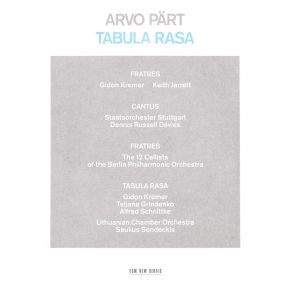Arvo Pärt: Tabula Rasa / Arvo Part: Tabula Rasa
Download links and information about Arvo Pärt: Tabula Rasa / Arvo Part: Tabula Rasa by Keith Jarrett, Gidon Kremer. This album was released in 1984 and it belongs to Classical genres. It contains 5 tracks with total duration of 55:06 minutes.

|
|
|---|---|
| Artist: | Keith Jarrett, Gidon Kremer |
| Release date: | 1984 |
| Genre: | Classical |
| Tracks: | 5 |
| Duration: | 55:06 |
| Buy it NOW at: | |
| Buy on iTunes $11.99 | |
| Buy on Amazon $9.49 | |
| Buy on iTunes $9.99 | |
Tracks
[Edit]| No. | Title | Length |
|---|---|---|
| 1. | Fratres (For Violin and Piano) | 11:33 |
| 2. | Cantus in Memory of Benjamin Britten (featuring Staatsorchester Stuttgart, Dennis Russell Davies) | 5:08 |
| 3. | Fratres (For 12 Celli) (featuring The 12 Cellists Of The Berlin Philharmonic Orchestra) | 11:59 |
| 4. | Tabula Rasa: I. Ludus (Live from Bonn, 1977) (featuring Schnittke Alfred, Lithuanian Chamber Orchestra, Saulus Sondeckis, Tatjana Grindenko) | 9:36 |
| 5. | Tabula Rasa: II. Silentium (Live from Bonn, 1977) (featuring Schnittke Alfred, Lithuanian Chamber Orchestra, Saulus Sondeckis, Tatjana Grindenko) | 16:50 |
Details
[Edit]Inspired by Gregorian chant, Renaissance polyphony, and plainsong, the so-called “mystic minimalism” of Estonian composer Arvo Pärt forever changed the landscape of contemporary classical music. Pärt found a broad audience with this groundbreaking 1984 release, which was overseen by visionary classical and jazz producer Manfred Eicher and released on the newly formed ECM New Series label. Combining the stark beauty of early music with contemporary minimalism, the recording brings "Fratres" in two forms—a haunting piano and violin duet performed by Keith Jarrett and Gidon Kremer and a swirling arrangement played by 12 Cellists of the Berlin Philharmonic. The sorrowful "Cantus in Memory of Benjamin Britten” is set against the distant tolling bells; their ghostly, nautical sound bidding a somber farewell to the British composer known for his love of the sea. The double concerto "Tabula Rasa" is both mathematically precise and profoundly moving, with Kremer and fellow violinist Tatjana Grindenko developing exquisite melodic patterns over Alfred Schnittke's prepared piano and a subtle—yet thunderously powerful—string chamber orchestra. In the words of Eicher, the recording marks “a truly electrifying encounter between the most unconventional stylists and protagonists of contemporary classical music and jazz.”